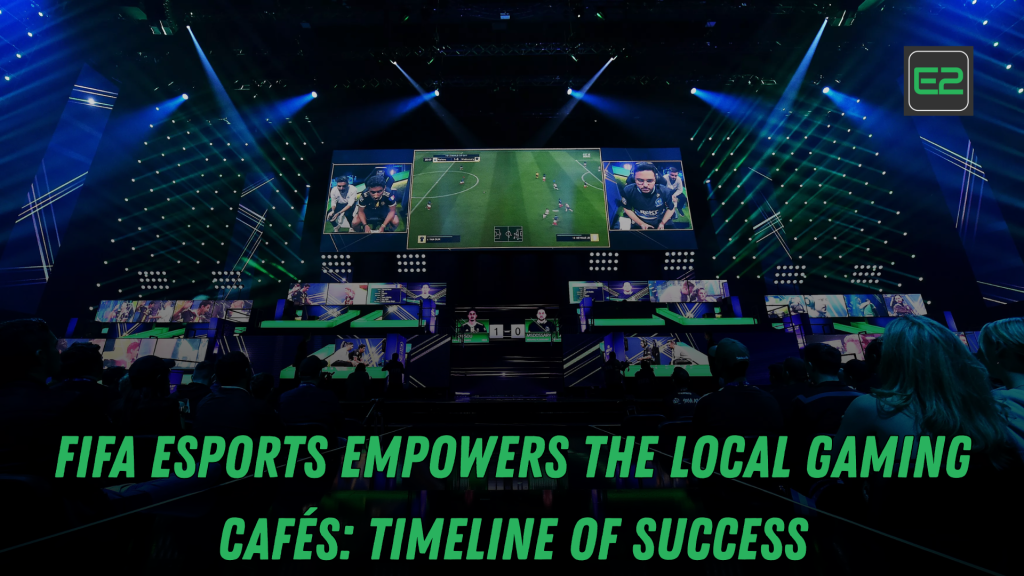Table of Contents
From Couch Play to Café Tournaments
In recent years, FIFA esports has evolved far beyond living rooms and casual gaming. Today, it plays a vital role in energizing local gaming cafés, especially across Southeast Asia and the Philippines, where the gaming culture continues to thrive. What was once a single-player experience has now transformed into a thriving community of local tournaments, competitive leagues, and esports success stories—all powered by FIFA’s enduring global appeal.
This article explores how FIFA esports has empowered local gaming cafés, creating business opportunities, fostering gaming communities, and inspiring the next generation of esports athletes.
The Global Rise of FIFA Esports
Since FIFA’s early days as a football simulation franchise, its esports scene has witnessed explosive growth.
Key Global Milestones:
- 2004: First FIFA Interactive World Cup (FIWC) launched.
- 2010s: The rise of FIFA YouTubers, streamers, and influencers brought the game online.
- 2018: FIFA eWorld Cup saw global participation and record viewership.
- 2020-2023: COVID-19 pandemic accelerates online FIFA esports tournaments.
As competitive FIFA became globally recognized, local gaming cafés saw an opportunity to bring the excitement home to their communities.

Local Gaming Cafés: The Heart of FIFA Esports in the Philippines
In countries like the Philippines, gaming cafés have historically served as social hubs for gamers. With FIFA esports gaining traction, these venues quickly adapted.
Why FIFA Fits the Gaming Café Scene:
- Simple 1v1 or team-based structure for local brackets.
- Low hardware requirements compared to PC esports.
- Combines casual play with highly competitive tournaments.
- Appeals to both football fans and video gamers.
Timeline: How FIFA Esports Boosted Local Gaming Cafés
2015-2017: The Casual Boom
- FIFA 15–17 grows in popularity among console gamers.
- Cafés start offering PS4 rental stations for FIFA matches.
- First grassroots FIFA tournaments emerge in Manila, Cebu, and Davao.
- Players enjoy social competition while casually playing with friends.
2018-2019: Organized Café Tournaments
- More cafés partner with local gaming organizers.
- FIFA tournaments become a weekend staple at many venues.
- Top cafés introduce small prize pools (cash, merchandise, free hours).
- Influencers and local streamers begin streaming café tournaments online.
2020-2021: The Pandemic Pivot
- Many cafés shut doors temporarily, but the FIFA esports community shifts to online tournaments.
- Local café owners host remote brackets via Discord, Zoom, and Facebook Gaming.
- Cafés learn to manage hybrid models: combining online qualifiers with limited in-person finals.
2022-2023: The Café Renaissance
- As lockdowns ease, gaming cafés experience a surge in FIFA interest.
- Hybrid tournament formats become the norm.
- Larger café chains like Mineski Infinity and High Grounds introduce full esports lounges with FIFA arenas.
- Sponsors like GCash, Globe, and ASUS start funding local café tournaments.
2024-2025: National Integration
- Local café champions start representing their regions in national FIFA esports qualifiers.
- Philippines Esports Organization (PeSO) and government-backed esports councils endorse FIFA tournaments.
- FIFA Mobile and FIFA Console leagues offer cross-platform tournaments hosted at cafés.
Dota 2 Sets the Standard for the SEA Games Selection: Beginner’s Guide

Why FIFA Esports Thrives in Local Cafés
Accessibility
- FIFA is easy to learn, making it ideal for casual café goers.
- The 1v1 format simplifies tournament logistics for café owners.
- Newer FIFA titles offer crossplay support—expanding player pools.
Community Building
- Cafés foster social bonding as friends gather to watch and cheer.
- Local rivalries grow as players return weekly for events.
- Bragging rights fuel competition, making each match personal.
Revenue Streams for Cafés
- Hosting FIFA tournaments boosts foot traffic.
- Cafés monetize via:
- Tournament entry fees
- Hourly play rentals
- Sponsorship activations
- Merchandise sales
Skill Development for Aspiring Pros
- Young players gain competitive experience through café tournaments.
- Scouting opportunities emerge for national FIFA squads.
- Training hubs help players develop game sense and composure.
Success Stories: From Café Champion to National Representative
Case Study: Mark “PinoyFIFA” Santos
- Began competing in café tournaments in Quezon City (2018).
- Won regional café leagues and entered national qualifiers.
- In 2023, represented the Philippines in the FIFA eNations Cup.
- Became a local esports influencer with thousands of followers.
Mark’s story highlights how cafés serve as the grassroots incubators for national esports success.

FIFA Esports Impact on Local Business
Café owners report significant benefits tied directly to FIFA tournaments:
| Metric | Improvement |
|---|---|
| Daily Foot Traffic | +35% on tournament days |
| Food/Beverage Sales | +20% during events |
| Customer Retention | +50% return rate among participants |
| Sponsorship Interest | Growth from 0 to 3+ partners per year |
Esports tournaments have helped stabilize café businesses post-pandemic, giving them new revenue models beyond simple hourly PC or console rentals.
The Role of Game Developers and Partners
EA Sports (Now EA FC)
- Supports local café events with tournament kits.
- Provides game license packages for café setups.
- Hosts regional FIFA Global Series events.
Local Sponsors
- Telcos like Globe and Smart fund prize pools.
- Banks and payment apps offer sponsorships (GCash tournaments).
- PC hardware brands partner with cafés for FIFA console hardware.
The Future of FIFA Esports in Local Cafés
The rise of FIFA esports has only just begun, and several trends are expected:
- More youth esports leagues integrating FIFA for high school and university tournaments.
- Growth of mobile FIFA esports tournaments hosted at cafés.
- Franchise-style local café leagues mirroring European football clubs.
- AR and VR spectator experiences for café patrons.
With esports now recognized by national governments as a legitimate sport, FIFA tournaments hosted in cafés could become the next wave of mainstream esports expansion.
The Power of Local FIFA Communities
From casual console sessions to national qualifiers, FIFA esports has empowered local gaming cafés to become community hubs, business lifelines, and competitive incubators. The game’s accessible gameplay, social nature, and universal football appeal make it the perfect fit for the café culture thriving in the Philippines and across Southeast Asia.
As the lines blur between digital football and real-world passion, FIFA esports will continue to write success stories—one café, one tournament, and one champion at a time.
Share your thoughts
Are you ready to experience FIFA esports firsthand?
Visit your local gaming café and sign up for their next FIFA tournament.
Share your café gaming stories using #FIFACafeChampion
Comment below: Who’s your favorite FIFA player or club in-game?
Because sometimes, the road to esports greatness starts at your neighborhood café.

